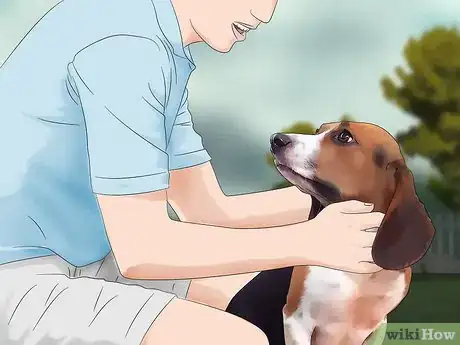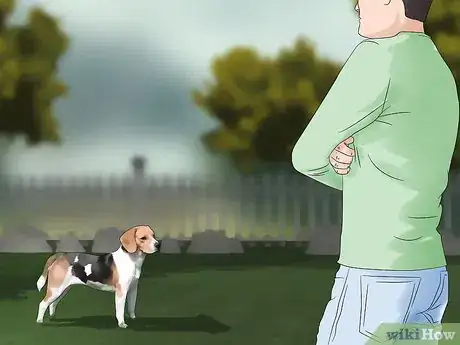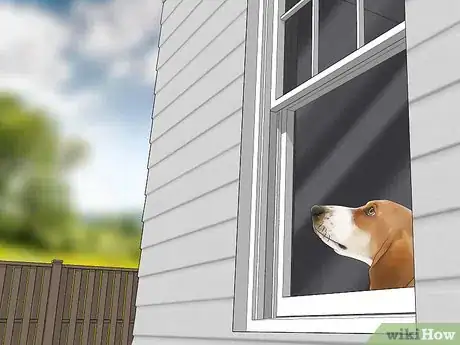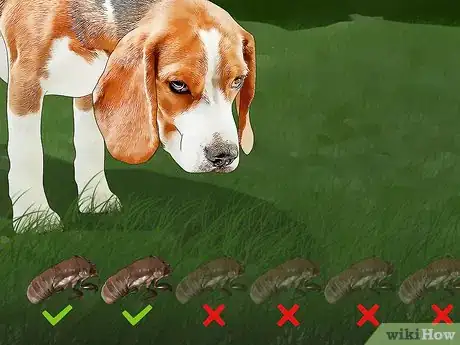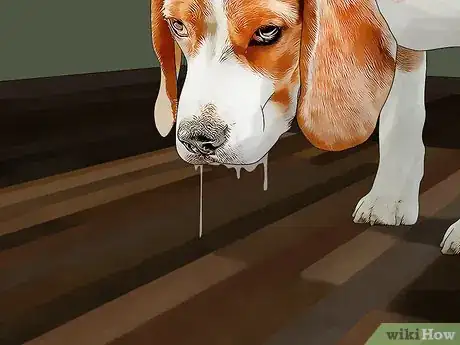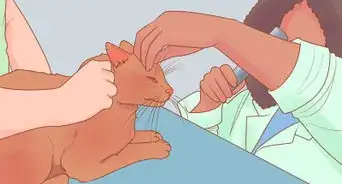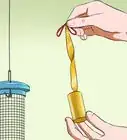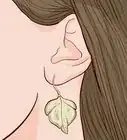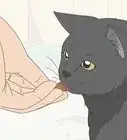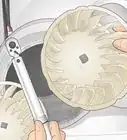This article was co-authored by Pippa Elliott, MRCVS. Dr. Elliott, BVMS, MRCVS is a veterinarian with over 30 years of experience in veterinary surgery and companion animal practice. She graduated from the University of Glasgow in 1987 with a degree in veterinary medicine and surgery. She has worked at the same animal clinic in her hometown for over 20 years.
This article has been viewed 27,967 times.
Cicadas are large insects that live underground for years, then emerge in enormous swarms to mate. Cicadas are primarily a noisy nuisance, since they are not toxic to pets and cannot transmit disease. However, eating too many cicadas can upset your pet's stomach. Do your best to stop your pets from eating these insects.
Steps
Keeping Pets Away from Cicadas
-
1Distract your pets when they’re outside. When cicadas emerge, they seem to be just about anywhere and everywhere you look. Plus, they’re easy targets for pets, since they fly slowly and stay low to the ground. Try distracting your pets to keep them from eating the cicadas.
- If you’re out walking your dog, give it treat or gently redirect it away from the cicadas.
- If you see your dog snooping around outside in your backyard during cicada season, distract it with a game of fetch or by giving it a command.
-
2Supervise your pets when outdoors. If you usually just open the door and let your dog outside by itself, consider going out with your dog during cicada season. This is particularly important if you have recently sprayed your yard with pesticides. Because the cicadas would have the pesticides on them when they emerge, your dog could become very sick if eats them.
- If you see your pet getting close to some cicadas, use distraction strategies to prevent your pets from eating the cicadas.
- If you have an outdoor cat, it may not be practical to supervise it all the time.
Advertisement -
3Keep your pets indoors. Except for walks and supervised time outdoors, keep your pets indoors as much as possible during cicada season. If you have an outdoor cat, consider keeping it indoors until after cicada season. Below are some strategies for making an outdoor cat an indoor cat:[1]
- Make the transition slowly. For example, feed your cat indoors and keep it indoors for increasingly longer periods of time after it finishes its meal.
- Make the indoors playful and inviting. Give your cat lots of toys and spend a lot of quality time with it when it’s inside.
Responding if Your Pets Eat Cicadas
-
1Limit your pet’s intake of cicadas. Despite your best efforts, your pets may insist on eating cicadas, even though they have a disgusting taste. Since cicadas can make your pets sick, don’t let your pets eat more than one or two of them at a time. While your pet is busy munching on a cicada, try to shoo away other nearby cicadas.
- If you’re lucky, your pets will try to eat one cicada, then spit it back out because it tastes bad. If your pet doesn’t like the taste, it probably won’t try to eat anymore.
-
2Look for GI symptoms. A pet who eats cicadas can suffer from vomiting or diarrhea. If your pets get sick after eating cicadas, you will likely see cicada parts in the vomit or diarrhea. Seeing this might make you feel sick, too! Fortunately, the vomiting and diarrhea are temporary and can easily be treated with medication.
-
3Watch your pet for an allergic reaction. Rarely, pets can have a severe allergic reaction, called anaphylactic shock, when they eat cicadas. Anaphylactic shock occurs within a few seconds to minutes after exposure to an antigen (substance that causes an allergic reaction). Signs of anaphylactic shock include pale gums, cold limbs, breathing trouble, and excessive drooling.[4]
- Anaphylactic shock is an emergency. If your pets have this severe reaction to eating cicadas, take them to your vet right away.[5] Call the vet when you’re on your way so they can be prepared to treat your pets as soon as you arrive.
Warnings
- Puppies that munch on cicadas may choke on the wings and hard exoskeleton.⧼thumbs_response⧽
References
- ↑ http://www.humanesociety.org/animals/cats/tips/bringing_outside_cat_indoors.html
- ↑ http://wtop.com/news/2013/05/how-will-the-cicada-invasion-affect-your-pets/
- ↑ http://www.merckvetmanual.com/mvm/digestive_system/diseases_of_the_stomach_and_intestines_in_small_animals/gastrointestinal_obstruction_in_small_animals.html
- ↑ http://www.merckvetmanual.com/pethealth/cat_disorders_and_diseases/immune_disorders_of_cats/disorders_involving_anaphylactic_reactions_type_i_reactions_atopy_in_cats.html
- ↑ http://www.2ndchance.info/anaphylaxis.htm
- ↑ http://wtop.com/news/2013/05/how-will-the-cicada-invasion-affect-your-pets/
- ↑ http://www.popularmechanics.com/home/lawn-garden/how-to/a8979/8-tips-to-survive-cicada-season-15502820/
About This Article
To keep your pet from eating cicadas, supervise it when its outside and distract it with treats if it tries to eat the cicadas. If you see your pet starts to eat a cicada, tell it, “No!” so it will drop the it. If your pet does eat cicadas, watch for symptoms such as vomiting or diarrhea, and go to the veterinarian if these symptoms are severe or don’t improve. To learn how to prevent your outdoor cat from eating cicadas, read more from our Veterinarian co-author.
